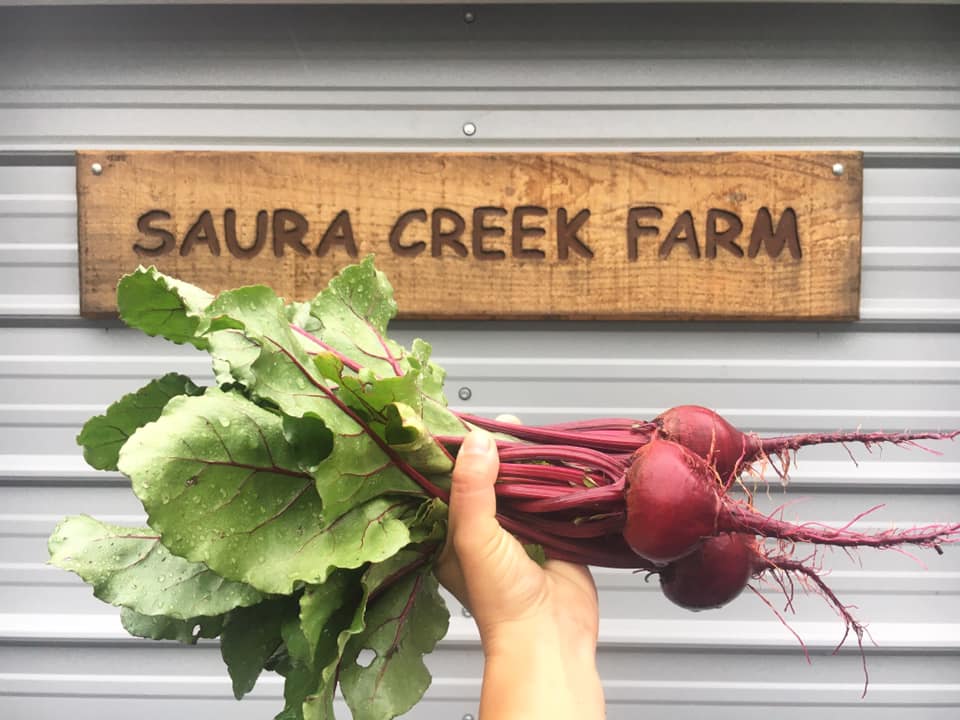Friday Spotlight Saura Creek Farm
go.ncsu.edu/readext?784748
en Español / em Português
El inglés es el idioma de control de esta página. En la medida en que haya algún conflicto entre la traducción al inglés y la traducción, el inglés prevalece.
Al hacer clic en el enlace de traducción se activa un servicio de traducción gratuito para convertir la página al español. Al igual que con cualquier traducción por Internet, la conversión no es sensible al contexto y puede que no traduzca el texto en su significado original. NC State Extension no garantiza la exactitud del texto traducido. Por favor, tenga en cuenta que algunas aplicaciones y/o servicios pueden no funcionar como se espera cuando se traducen.
Português
Inglês é o idioma de controle desta página. Na medida que haja algum conflito entre o texto original em Inglês e a tradução, o Inglês prevalece.
Ao clicar no link de tradução, um serviço gratuito de tradução será ativado para converter a página para o Português. Como em qualquer tradução pela internet, a conversão não é sensivel ao contexto e pode não ocorrer a tradução para o significado orginal. O serviço de Extensão da Carolina do Norte (NC State Extension) não garante a exatidão do texto traduzido. Por favor, observe que algumas funções ou serviços podem não funcionar como esperado após a tradução.
English
English is the controlling language of this page. To the extent there is any conflict between the English text and the translation, English controls.
Clicking on the translation link activates a free translation service to convert the page to Spanish. As with any Internet translation, the conversion is not context-sensitive and may not translate the text to its original meaning. NC State Extension does not guarantee the accuracy of the translated text. Please note that some applications and/or services may not function as expected when translated.
Collapse ▲Our names are Sumpter and Madison Smith and we are first-generation farmers and owners of Saura Creek Farm. Sumpter is 32, previously a mechanic specializing in European high-end vehicles and Madison is 30, a graduate from UNCG with a degree in Therapeutic Recreation; we have been together for 11 years and married for 4. We have always been passionate about doing something that gives back to the environment, helps our community, and allows us to work outdoors which led us to small-scale farming.
We’ve had multiple gardens together through the years but really got serious about searching for land in 2015. In April 2016 we were able put all of our savings together to purchase the property we are on now in Westfield, NC. Our property is four acres; we farm about an acre and the remaining acreage is predominately woods with a chicken pasture and a creek. When we bought the land we dedicated ourselves to learning how to farm intensively while using biodynamic methods. Learning happened everywhere: we started talking to local farmers and visiting their farms, we watched millions of YouTube videos and bought and read every small-scale farming book we could get our hands-on. Madison was fortunate enough to attend the Annual Organic Growers Conference in Ashville, NC in 2018 where she learned a ton and made some great contacts. The land we purchased had previously been used for hunting and was farmed for tobacco way back in the day, but it had not been farmed in a very long time.
We began with buying a flock of 12 chickens which we kept in a chicken tractor and moved daily across what was going to be our vegetable field. After we would move the chickens daily we would throw mulch and compost on top of where they were until the whole field was covered. In total, we threw 33,000 lbs of compost and 18,000 lbs of mulch onto our field. We did one big till, our one and only till just to break up the clay a bit, and proceeded to hand hoe the field into rows, 30” wide and 50’ long. As soon as the beds were established, we tarped the entire field for 3 months to kill off the first round of weed pressure and to let the field recoup from being tilled and hoed. Once that passed, we lifted the tarp and began filling rows with crops that are seeded on the farm then transplanted by hand. Madison maintained a full-time, off-farm job until November of 2019 to support the farm while Sumpter stayed busy building the much-needed infrastructures. Sumpter built a greenhouse, a seed propagation station, the wash/pack station, walk-in refrigeration, and the aquaponics system. The farm slowly started coming together and we had to learn everything behind owning and operating a business as fast as we could. We started going to local markets in early 2019 and have not stopped since.
Our farm is small so we have to farm intensively; this means companion planting, pulling plants as soon as they stop producing, and rotating crops mindfully. We never plant the same crop in a spot where it was planted previously. Also, we are attentive to the amount of times we broad fork a bed, careful not to mess with the soil biology as much as we can. When it comes to weed pressure, we make the time weekly to pull by hand. When it comes to bugs we use only OMRI (Organic Materials Review Institute) approved insecticides and biocides such as Bt (Bacillus thuringiensis). We truly believe that healthy, living soil is the key so we add compost as well as some natural amendments such as feathermeal, rock phosphates, and azomite to each bed as needed in between plantings. We even add the fish fertilizer from the aquaponics system. We use overhead watering for our plot which works for now, but we are hoping to upgrade to drip eventually. We grow seasonal vegetables specializing in our salad mix. Our wash/pack station, as well as our cooler, make a huge difference for us when it comes to quality and preservation of our product.
Our aquaponics system is the newest addition to our farm. The system is located on our farm inside a 17’x60’ greenhouse which includes the fish tank, the filters, and the three 4’x35’ growbeds. We designed our system for Trout since it is a fish that we could profit more from when harvested than another type of fish, such as tilapia. The system is a continuous cycle which uses the waste from the fish to fertilize and feed the produce. The bacteria needed to make the system run correctly had to be cultured on its own which took some time but we were able to introduce fish and begin planting lettuce varieties and herbs in the system in May 2020 and it has been running since. We have run into many setbacks with the system, building and rebuilding parts, and constantly trying new ideas. Our biggest challenge with the system so far has been keeping the water temperature down enough for the fish to thrive. So far we have built a geothermal cooling system, covered the entire greenhouse with shade cloth, and installed multiple fans. We are still a work in progress with the system; it will always be changing and moving. It is just the two of us, so we spend money and time on it when we can and dream of what it is to become.
This year we also introduced two honeybee hives to our farm which has been an amazing experience. We absolutely love having the bees work around the farm with us and we can tell the plants love it too. We will let them get acclimated with the farm for a year or two before we try to extract any honey from them.
We both have learned and grown so much as individuals through this entire process of starting the farm, and this is only the beginning. We have so many goals and aspirations which are discussed daily in the field. We plan to stay small, but expand a few more plots on our farm so we can feed more people. There is nothing that drives us more than hearing our customers rave to us about our product all while knowing their body is probably feeling the same way! We believe in nutrient-dense, fresh, local, seasonal food, much as the Saura Tribe did on this same land so many years ago.
If you would like to learn more or buy from a local Stokes County farm use the links below:





